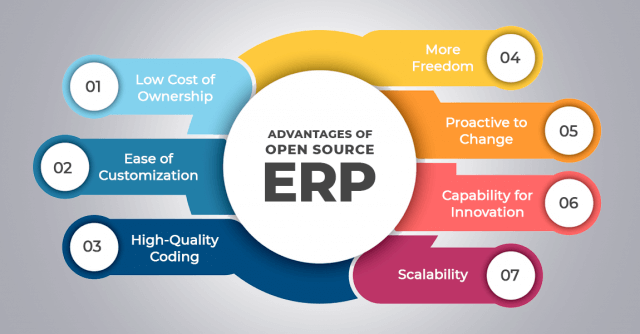Open-source software has gained a significant foothold in the world of business. Accelerated adoption of open source ERP and customer relationship management (CRM) solutions are the next transformative steps in this process. Open-source ERP solutions can be used straight out of the box and it needs very limited configuration and data.
Businesses, especially Small and Medium Enterprises (SMEs) can then get started with the ERP technology without any major customization. They get time to evaluate whether to customize it to meet their requirements. Since upfront licensing is not required, SMEs do not need to worry about reviewing the ERP licence.
Proprietary ERP doesn’t extend free access to developers to change program code, while open source ERP software welcomes developers and users to test, improve, and build upon the ERP code. Open source ERP and proprietary ERP aim to accomplish the same goal which is to integrate business processes and data within a central ERP database. Open source ERP can integrate customer relationship management, financial systems, accounting, human resources, sales and marketing, business intelligence, and other applications as well.
The general popularity of open source ERP systems can be attributed to the fact that the application code can be circulated among a dedicated community of developers and users. This helps a scenario where the ERP as an application can benefit from “crowdsourcing” work that a dedicated R&D of that company typically carries out.
When source code is accessible, the developer community can potentially solve bugs and issues while also introducing new features and tailored functionality. Therefore, as against waiting for an ERP vendor to release patches and updates, the community of users can release enhancements and fixes as they see fit. Now, this is a win-win for the user community and the product company.

Open Source ERP System: An Ideal Choice for SMEs
With new technology becoming more accessible to businesses, smaller enterprises are actively acquiring tools that were previously available only to large corporations. SMEs are working alongside big-league players, thereby creating a wider pool of competition and an added level of urgency for those lagging. Given this environment and at the rate at which businesses of all sizes are proliferating, managers have no choice but to adopt a technologically advanced solution for process efficiency.
How to Choose Open Source ERP
A structured, data-driven approach should be adopted to find the best possible open source ERP for a business It is mandatory that objectives are clearly defined and are in line with business processes and then align ERP evaluation criteria accordingly. This will help confirm that software modules and features cover business requirements as much as possible.
Some businesses may also choose to evaluate their open source ERP comparison based on the programming language that the system is built on—a business requirement unique to this type of ERP. Each language will have pros and cons, such as aspects like compatibility with existing apps and hardware, the complexity of the code, performance, and other functional capabilities of the language. Therefore, an open source ERP in Java will be much different to work with than one in say, a PHP language.
Partner with an experienced ERP consulting and services provider to choose the right open source ERP system. Gemini Consulting & Services can help you in selecting and implementing open source ERP software. Contact us to know how you can gain maximum value from open source ERP.

Low Cost of Ownership: SMEs have to be thrifty with their monies; one of the most attractive aspects of open source ERP software is the cost. Typically, there’s no need to pay a significant up-front license fee or a subscription to start using an open source application. The very point of why an open source ERP has been developed is to first provide excellent functionality for SMBs at a much lower cost than regular proprietary solutions.
Ease of Customization: Open source ERP license extends the ability to customize the code as agreed upon in the contract in the beginning. This is not true of proprietary systems as they can be very expensive and can be provided only by authorized service partners. Most open source ERP applications become a perfect fit through customization driven by a community of experts, thereby cutting down costs and efforts required to deploy a custom implementation.
High-Quality Coding: Many low-cost open source ERP solutions offer high-quality coding because they’re built on previous open source projects that have been reviewed by various independent developers. It makes it easy for skilled internal IT staff of the business to be resourceful and audit open source code for quality. With closed source ERP solutions, IT employees are not extended access to the source code. It is possible only to test whether software processes work correctly with business data.
More Freedom: With open source software systems, companies can be more self-reliant and less dependent on vendors or authorized service providers. As a result, SMEs can time and resources. Most open source ERP solutions allow for greater choice of partners and avoid potential issues with data becoming locked within a vendor’s ecosystem.
Proactive to Change: A developer with an open source license can immediately apply improvements and fixes to the software but with a proprietary ERP system, changes can be carried out only after vendor approval.
Capability for Innovation: The ability to draw knowledge and inspiration from a wide field of talented developers and end-users adds a tremendous amount of value to an open source ERP system. Tech behemoths like Google and Microsoft embrace open source projects due to the value that is added to their software products and technology. This creates the potential for unexpected innovation that wouldn’t be possible within a traditional software development environment.
Scalability: One of the biggest challenges in selecting an ERP solution looms around its ability to scale. Growing companies realize too late that upgrading their software or increasing the number of users mostly requires costly reimplementation. Open source ERP is easier to scale and can be upgraded more frequently without causing disruptions. However, it is important to remember that this can be successful only when system customizations are properly implemented.



